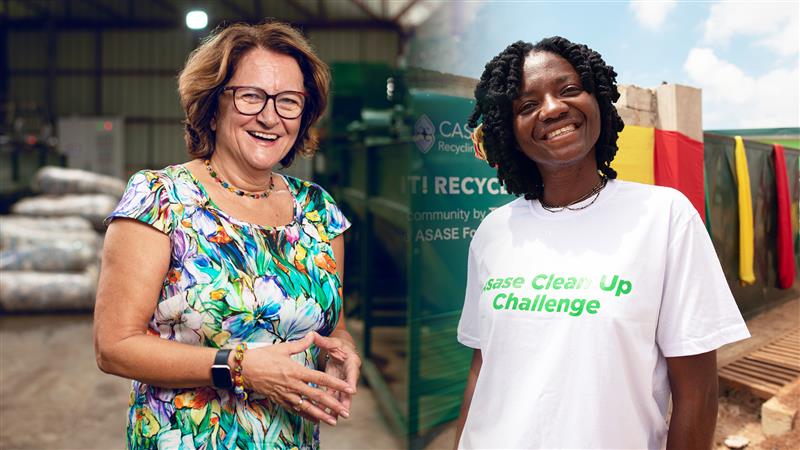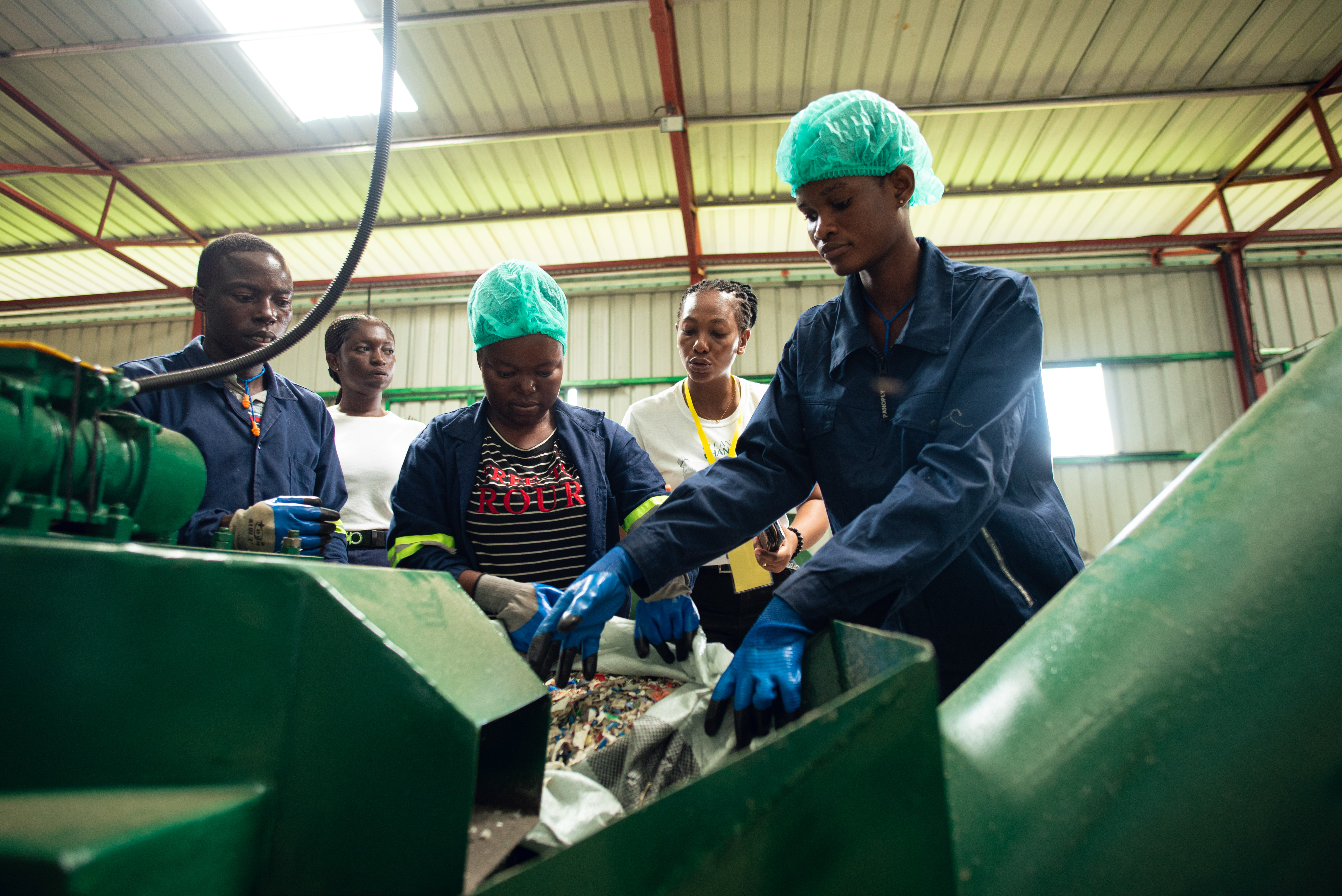
A future through waste: How ASASE is building a viable recycling system by empowering women
Every year, Ghana generates 840,000 tonnes of plastic waste, fuelling the rise of an informal yet vital waste picking sector. Despite their critical role, informal waste pickers often operate under dangerous conditions and lack job security. In this article, we explore how ASASE is changing this narrative, giving waste pickers, including those from vulnerable groups (mostly women), a safer, more dignified and financially sustainable means of employment.
Addressing Ghana’s growing plastic waste problem is fraught with significant and mounting challenges.
The country generates about 840,000 tonnes of plastic waste annually—the equivalent weight of about 154,000 African elephants. However, because of poor waste management processes and infrastructure, only 9.5% of it is recycled. The remainder ends up in landfills, is burned in open pits, or leaks into the environment, polluting oceans and clogging waterways.
Yet, the gap in waste management facilities offers a lifeline to many in Ghana, particularly residents from impoverished backgrounds with little education. With limited access to job opportunities, they pick waste and salvage scraps such as plastics and metal to sell to recycling centres and other businesses.
Overlooked, invisible, yet integral
Waste picking is an unenviable job. Informal waste pickers toil long hours in harsh environments with little protection against the toxic elements emitted by waste, and for a pittance. According to a Green Africa Youth Organization report, informal waste workers in Ghana work about 8.3 hours daily, earning an average of GH₵39.77 (US$2.17)—the UN threshold for extreme poverty.
Because they are not officially recognised as part of the country’s workforce, informal waste workers lack job security, labour rights and other crucial employment benefits such as medical insurance and paid leave. They also must contend with persistent social stigma that not only undermines their work and hinders their collection but also diminishes their sense of self-worth.
The challenges are even more pronounced for women informal waste workers. Without labour rights such as maternity and childcare leave, they experience greater challenges caring for their families. Additionally, women informal waste workers also face the threat of sexual abuse and harassment at work, exacerbating their vulnerabilities.
NGOs in Ghana are seeking to change this narrative. They play a critical role in helping informal waste workers regain dignity, operate under safer conditions, and access equitable wages and support systems. One such NGO is the ASASE Foundation, which operates in the Greater Accra Region.
How ASASE levels up the informal waste picking sector
Named after ASASE Yaa, the West African goddess of Earth, ASASE was founded in 2017 by Dana Mosora, a chemical industry veteran, and Hilda Addah, a community social worker.
Growing up in Ghana, Addah witnessed firsthand the consequences of plastic pollution when one of her family’s sheep died because it ingested too much plastic. To address plastic waste’s growing impact on Ghana’s population, Addah enlisted Mosora’s expertise in plastic packaging production.
The duo founded ASASE with two goals: to advance greater circularity in plastic waste —i.e., maximising the value extracted from recycling plastic waste. They also wanted to empower informal waste workers — particularly women — to grow their own plastic recycling businesses. To drive this initiative, ASASE established the CASH IT! recycling plants.
As a community-based social enterprise, the CASH IT! recycling plants actively recruit existing informal waste workers. “These waste workers are already familiar with the work; we are only giving them greater job security,” said Mosora. “ASASE recognises the importance of waste pickers in the collection value chain, especially in a country where there are no appropriate segregated collection systems.”
CASH IT!’s employees receive uniforms, social security contributions, steady salaries and other benefits like maternity leave, giving them legitimacy in the public eye.

Waste pickers in ASASE’s collection network now work under safer conditions. They are trained in operational health and safety and are equipped with personal protective equipment (PPE). Through ASASE’s network, these waste pickers can also access better prices.
ASASE is also gradually rolling out health insurance and vaccinations for typhoid and hepatitis, both growing public health concerns in the country, for waste pickers.
ASASE regularly organises community outreach programmes to educate residents about the value of plastic waste. These efforts also serve as opportunities for ASASE to recruit new workers from rural and marginalised communities, giving them a vital pathway to safer working conditions and more stable earnings.
Training for a brighter future
“Most of the people we recruit do not have much education or technical training. So, we conduct on-the-job training. As a result, they acquire technical proficiency through learning to operate the recycling equipment,” said Mosora.
ASASE wants its recycling plants to be places where workers can develop holistic skills to help them excel in other working environments.
“Our employees pick up invaluable transferable skills through working at our CASH IT! recycling plants. Besides acquiring vocational skills such as mechanical and electrical expertise, our employees learn the importance of ethics in the workplace and develop crucial management expertise. These skills boost their job prospects and enable them to work in other manufacturing and production plants,” said Mosora.
While waste management is not generally perceived as exciting, ASASE has enticed graduates and interns from universities and technical schools to manage its recycling plants. Over time, ASASE has had to recruit more educated and experienced professionals as the operations grew in scale and complexity.
These individuals bring diverse skill sets, spanning financial management to community engagement, which are necessary for the long-term success of the plants. Mosora said that the ASASE’s ability to attract highly skilled workers, including experienced hires and university graduates, is a testament to the organisation’s growing reputation and ability to raise awareness of the value of plastic waste.
Mosora said the recycling plants have fostered a cohesive company culture, strengthening employee loyalty. In 2023, a downturn in the recycling market and technical issues forced the CASH IT! plants to suspend operations, resulting in employees taking a temporary pay cut. Despite this setback, employees did not quit their jobs, even resisting poaching attempts by competing firms. Mosora added that it is also because ASASE is well-positioned to deliver financial security.
“Because of the continuous funding we are getting from the World Bank, as well as funding from the Alliance and European Union, we are able to pay good salaries,” said Mosora.
It takes a village to enable a just transition
ASASE has a noble mission. But to achieve those ambitious goals, it needed substantial financial backing.
Seeing ASASE’s potential, the Alliance began supporting the organisation in 2020, providing technical expertise and financial assistance to scale its operations.
ASASE’s partnership with the Alliance also broadened its exposure to a global network of investors and other organisations in the sustainability space, enabling it to catalyse more funding. In 2021, the European Union stepped into the picture, giving ASASE much-needed support to ramp up the plastic waste processing capabilities of its CASH IT! plants and develop a plastic lumber factory.

In 2024, ASASE partnered with Plastic Collective, a trading company for plastic credits. This collaboration enabled ASASE to sell plastic credits under the Verra Plastic Waste Reduction Standard.
Plastic credits are a financial mechanism designed to incentivise plastic waste reduction. Companies purchase these credits to fund waste management projects, such as recycling or cleanup initiatives, which help offset their plastic footprint.
Through the Plastic Collective, ASASE could access part of a US$100 million, seven-year Plastic Waste Reduction-Linked Bond launched by the World Bank and Citibank in 2023. This initiative connects investors to impactful and environmentally friendly projects.
Today, ASASE operates three CASH IT! recycling plants, with one purpose-built to produce plastic lumber for the local market. All of the CASH IT! recycling plants have met their milestones and are operating at full capacity. They have even surpassed several key impact metrics, collectively reducing over 4,000 tonnes of unmanaged waste in 2024*.
Key lessons from ASASE
Developing a plastic waste collection project in an emerging country like Ghana can be difficult. Engaging and building trust with the community and informal waste workers, recruiting employees, and training them in business management and operational and environmental safety require significant time and effort. But the impact is well worth the sweat.
ASASE has also demonstrated that running a plastic waste recycling facility at a low cost is possible by sourcing mainly locally available equipment. These include a washing line (a machine that cleans plastic waste before processing) made in Ghana and an extruder (a machine that melts and reshapes material such as plastic waste) purchased from China.
ASASE’s success story offers a blueprint for similar recycling initiatives in developing countries. The team’s dedication to combating plastic waste, combined with deep industry knowledge and a nuanced understanding of local opportunities and challenges, has enabled them to drive impact effectively. In five years, ASASE has built a strong reputation in Accra, Ghana, empowering informal workers by bringing them into the formal sector and promoting a circular economy.
*Pending assurance
Stay in the loop
Subscribe to our newsletter for the latest news and updates from the Alliance







